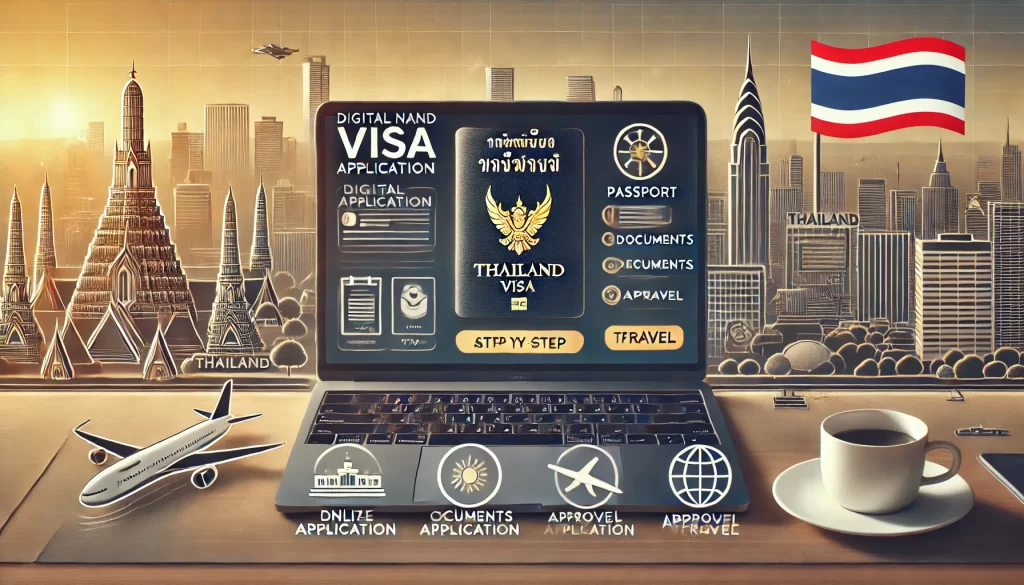Are you tired of juggling tourist visas and border runs while trying to work remotely in Thailand? 🇹🇭✈️ The new Digital Nomad Visa (DTV) could be your ticket to a hassle-free stay in the Land of Smiles. But navigating the application process can feel like a maze without a map.
Imagine settling into your favorite beachside café, laptop open, knowing you’re legally working with peace of mind. No more visa anxiety or rushed exits every few months. The DTV offers this freedom, but only if you know how to secure it. Many aspiring digital nomads stumble at the first hurdle, overwhelmed by the requirements and unsure where to begin.
Don’t let confusion keep you from your Thai adventure. In this comprehensive guide, we’ll walk you through every step of the DTV application process. From understanding the visa’s benefits to maintaining your status once approved, we’ve got you covered. Let’s dive into the essentials of turning your Thai digital nomad dreams into reality. 🌴💻
Understanding the Digital Nomad Visa (DTV)
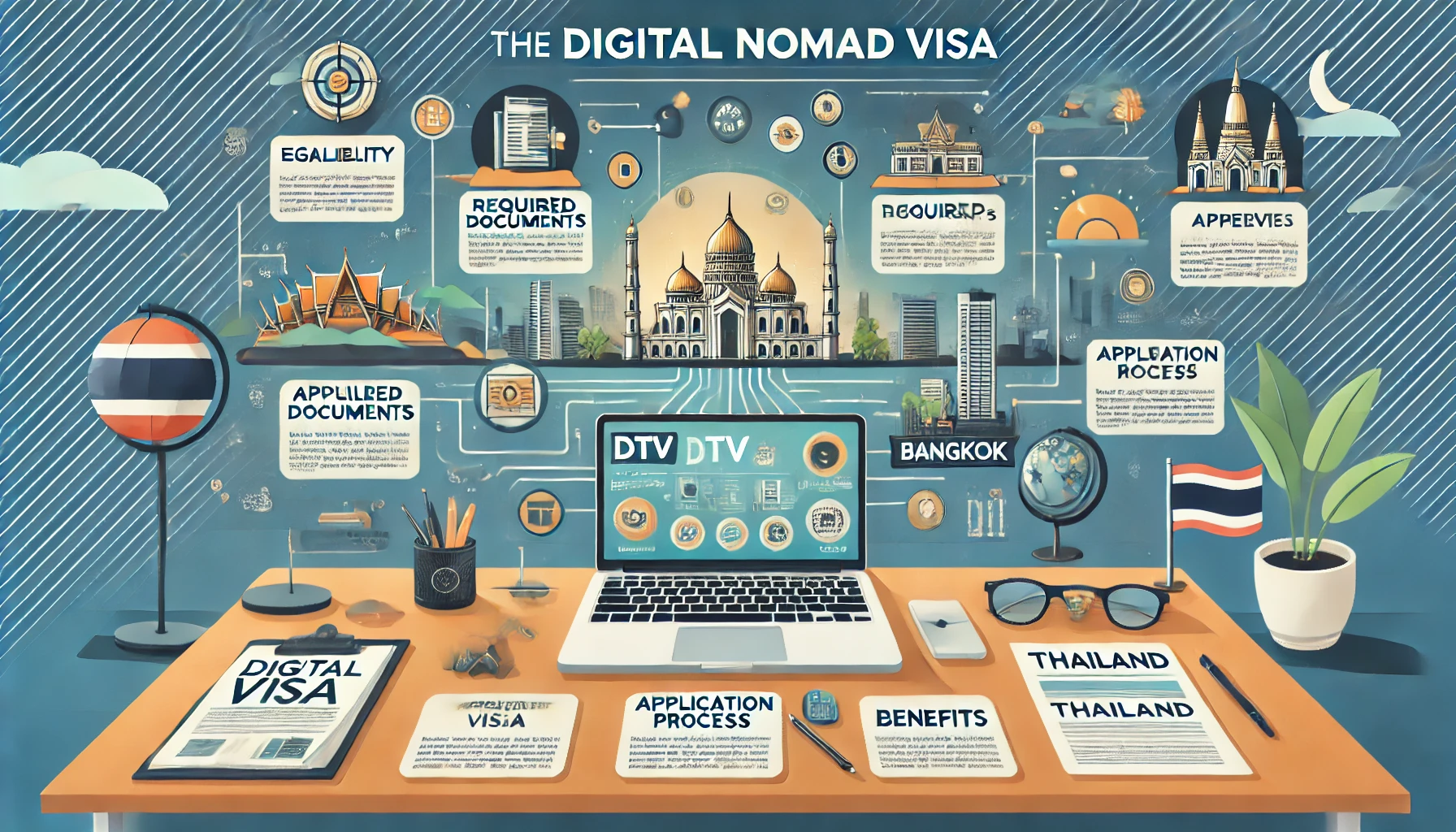
Benefits of the DTV for digital nomads
The Digital Nomad Visa (DTV) in Thailand offers several advantages for remote workers and digital entrepreneurs:
- Extended stay: Up to 10-year visa with minimal renewal requirements
- Work flexibility: Legal permission to work remotely for overseas companies
- Tax benefits: Potential tax exemptions on foreign-earned income
- Simplified immigration process: Streamlined visa application and approval
- Access to local services: Easier opening of bank accounts and obtaining driver’s licenses
| Benefit | Description |
|---|---|
| Extended stay | Long-term residency without frequent visa runs |
| Work flexibility | Freedom to work remotely without local employment restrictions |
| Tax benefits | Possible exemption from Thai income tax on foreign earnings |
| Simplified process | Easier visa application compared to other long-term visas |
| Local access | Improved ability to use Thai financial and government services |
Eligibility criteria for applicants
To qualify for the DTV in Thailand, applicants must meet specific requirements:
- Minimum annual income of $80,000 for the past two years
- At least 5 years of work experience in relevant fields
- Employment contract with a foreign company or proof of business ownership
- Clean criminal record
- Valid health insurance coverage
Duration and renewal options
The DTV offers flexibility in terms of duration and renewal:
- Initial visa granted for 5 years
- Option to extend for an additional 5 years
- Total possible stay of up to 10 years
- Annual reporting to immigration authorities required
- Simplified renewal process compared to other visa types
Now that we’ve covered the basics of the Digital Nomad Visa, let’s move on to the essential documents you’ll need to gather for your application.
Gathering Required Documents

A. Passport and photographs
To apply for a Digital Nomad Visa (DTV) in Thailand, you’ll need to prepare the following essential documents:
- Valid passport
- Passport-sized photographs
Your passport must be valid for at least 6 months beyond your intended stay in Thailand. Ensure you have enough blank pages for visa stamps.
For photographs, you’ll typically need:
- 2-4 recent passport-sized photos
- Taken within the last 6 months
- White background
- Full face view
- No glasses or head coverings (unless for religious reasons)
| Passport Requirements | Photo Requirements |
|---|---|
| Valid for 6+ months | 2-4 recent photos |
| Blank pages available | White background |
| Good condition | Full face view |
B. Proof of employment or business ownership
You must provide evidence of your work status as a digital nomad. This can include:
- Employment contract
- Freelance agreements
- Business registration documents
- Client contracts or invoices
Ensure all documents are in English or accompanied by certified translations.
C. Financial statements and income proof
To demonstrate financial stability, prepare:
- Bank statements (last 6 months)
- Income tax returns
- Pay stubs or invoices
- Investment portfolio statements
Thailand requires proof of a minimum monthly income, typically around $2,500 USD or an equivalent savings balance.
D. Health insurance coverage
Secure comprehensive health insurance that covers:
- Medical treatment in Thailand
- COVID-19 coverage
- Minimum coverage of $50,000 USD
Provide the policy document and proof of payment.
E. Criminal background check
Obtain a police clearance certificate from your home country or country of residence for the past 6 months. This document should be:
- Original
- Issued within the last 3 months
- Apostilled or legalized
Now that you’ve gathered these essential documents, you’re ready to move on to completing the online application for your Digital Nomad Visa.
Completing the Online Application
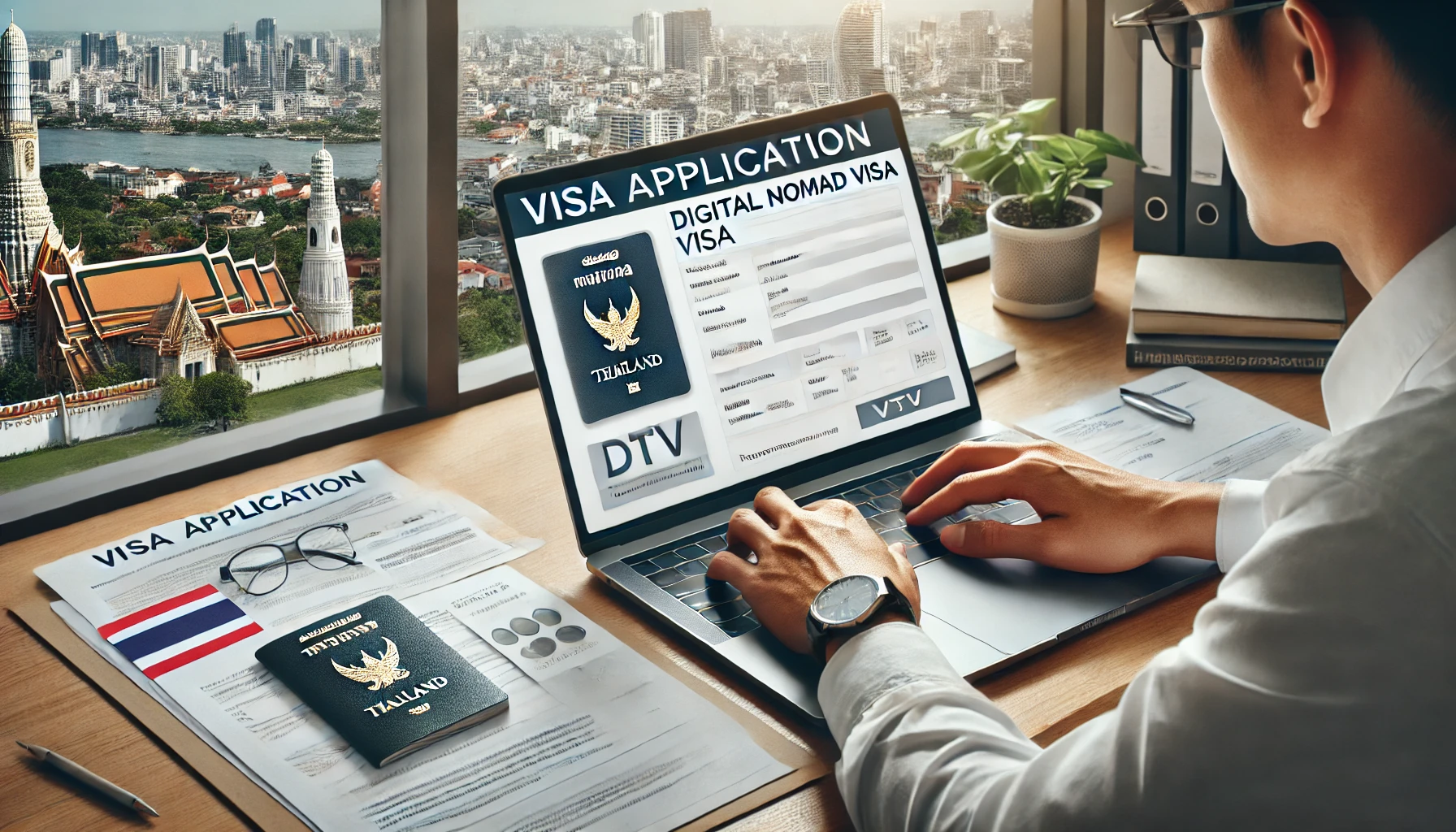
Creating an account on the official website
To begin your DTV application process, you’ll need to create an account on the official Thai government website. Follow these steps:
- Navigate to the official DTV application portal
- Click on the “Register” or “Create Account” button
- Provide your personal information, including:
- Full name
- Email address
- Password
- Verify your email address
- Log in to your newly created account
Filling out the application form accurately
Once logged in, you’ll need to complete the DTV application form. Pay close attention to detail and ensure all information is accurate:
- Personal details (name, date of birth, nationality)
- Passport information
- Employment history
- Financial statements
- Intended length of stay in Thailand
| Section | Tips |
|---|---|
| Personal Details | Use information exactly as it appears on your passport |
| Employment | Provide detailed work history for the past 5 years |
| Financial | Be prepared to show proof of funds or income |
Uploading necessary documents
After completing the form, you’ll need to upload supporting documents:
- Scanned copy of your passport
- Recent passport-sized photograph
- Proof of employment or business ownership
- Bank statements or proof of funds
- Criminal background check
- Health insurance certificate
Ensure all documents are clear, legible, and in the required format (usually PDF or JPG).
Paying the application fee
The final step is to pay the DTV application fee:
- Review the fee amount
- Choose your preferred payment method (credit card, bank transfer, etc.)
- Complete the payment transaction
- Save the payment confirmation for your records
After submitting your application and payment, you’ll receive a confirmation email. The next step will be to schedule your visa interview at a Thai embassy or consulate.
Scheduling and Attending the Visa Interview
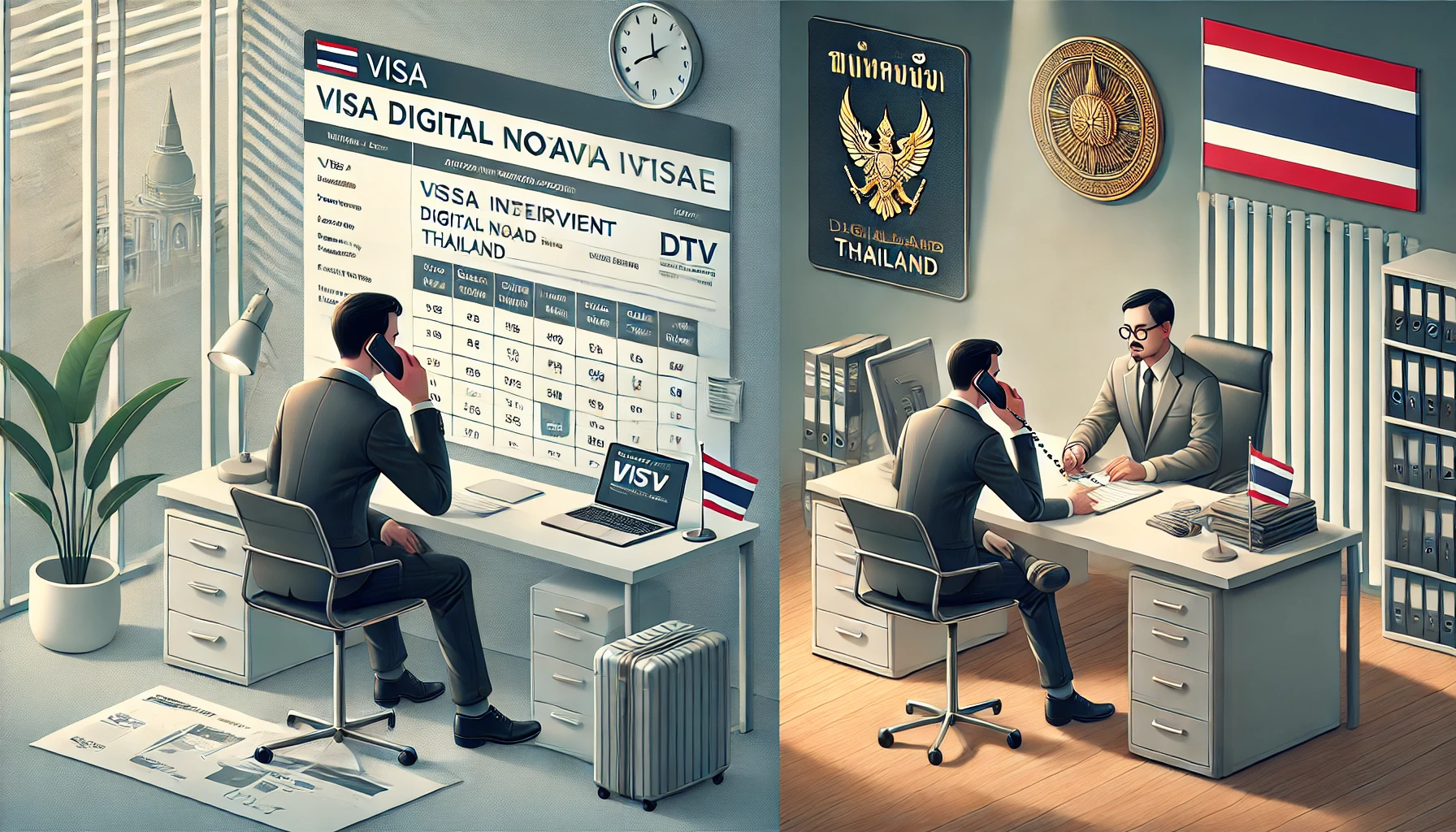
Choosing a Thai embassy or consulate
After completing your online application, it’s time to schedule your visa interview. Start by selecting the most convenient Thai embassy or consulate for you. Consider factors such as proximity to your current location and available appointment slots. Here’s a comparison of common options:
| Embassy/Consulate | Location | Processing Time | Appointment Availability |
|---|---|---|---|
| Bangkok | Thailand | 3-5 days | High |
| New York | USA | 5-7 days | Medium |
| London | UK | 4-6 days | Medium |
| Berlin | Germany | 5-7 days | Low |
Booking an appointment
Once you’ve chosen your preferred location, book your appointment through the official website or contact the embassy directly. Be prepared with the following:
- Your passport number
- Application reference number
- Preferred date and time
Preparing for interview questions
To ensure a smooth interview process, familiarize yourself with common questions:
- Why do you want to work remotely from Thailand?
- How long do you plan to stay?
- What is your current employment status?
- How will you support yourself financially during your stay?
Practice your responses to demonstrate your genuine interest and eligibility for the DTV.
Bringing original documents
On the day of your interview, bring all original documents, including:
- Passport (valid for at least 6 months)
- Completed visa application form
- Recent passport-sized photographs
- Proof of employment or business ownership
- Bank statements showing sufficient funds
- Health insurance coverage documentation
Double-check this list to avoid any last-minute issues. With thorough preparation, you’ll be well-equipped for a successful visa interview.
Post-Approval Steps
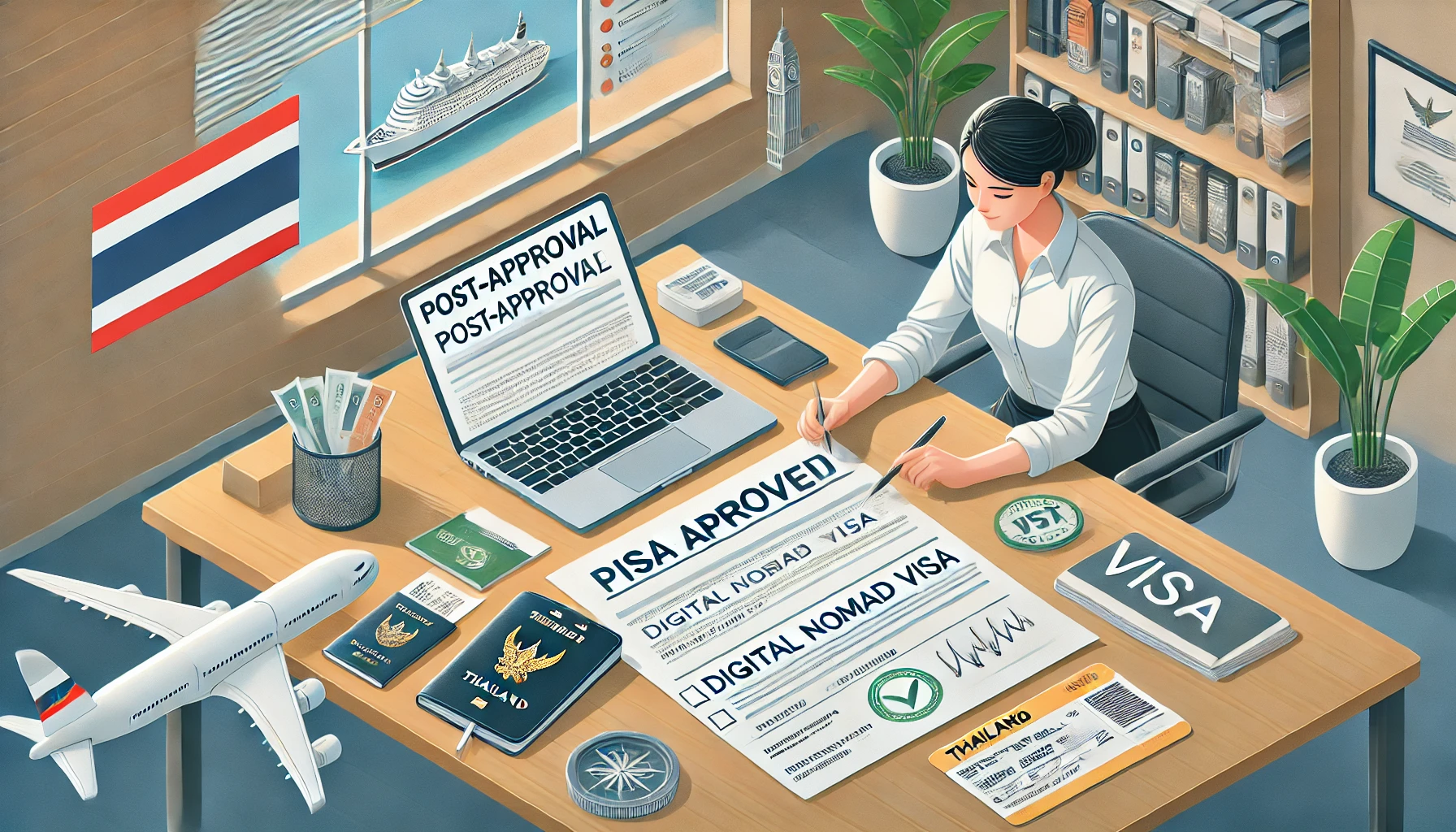
A. Obtaining the visa sticker
Once your Digital Nomad Visa (DTV) application is approved, the next crucial step is obtaining the visa sticker. This process typically involves:
- Passport submission
- Payment of visa fees
- Waiting period
- Visa collection
| Step | Description | Estimated Time |
|---|---|---|
| Passport submission | Submit your passport to the Thai embassy/consulate | 1 day |
| Payment of visa fees | Pay the required fees for visa processing | Same day |
| Waiting period | Allow time for visa sticker preparation | 3-5 business days |
| Visa collection | Collect your passport with the new visa sticker | 1 day |
B. Planning your arrival in Thailand
With your visa in hand, it’s time to plan your arrival. Consider the following:
- Book your flights to Thailand
- Arrange accommodation for your initial stay
- Research transportation options from the airport
- Prepare necessary documents for entry (passport, visa, proof of funds)
C. Registering with local authorities
Upon arrival in Thailand, you must register with local authorities within 90 days. This process involves:
- Visiting the local immigration office
- Completing the TM30 form
- Providing proof of address
- Submitting necessary documents (passport, visa, photos)
D. Opening a Thai bank account
Opening a Thai bank account can simplify your financial transactions. Here’s what you need to do:
- Choose a reputable Thai bank
- Gather required documents (passport, visa, proof of address)
- Visit the bank branch in person
- Complete the account opening process
Remember to inquire about online banking services and international transfer options to manage your finances effectively during your stay in Thailand.
Now that you’ve completed these post-approval steps, you’re ready to begin your digital nomad journey in Thailand. Next, we’ll explore how to maintain your DTV status and make the most of your stay in the Land of Smiles.
Maintaining DTV Status
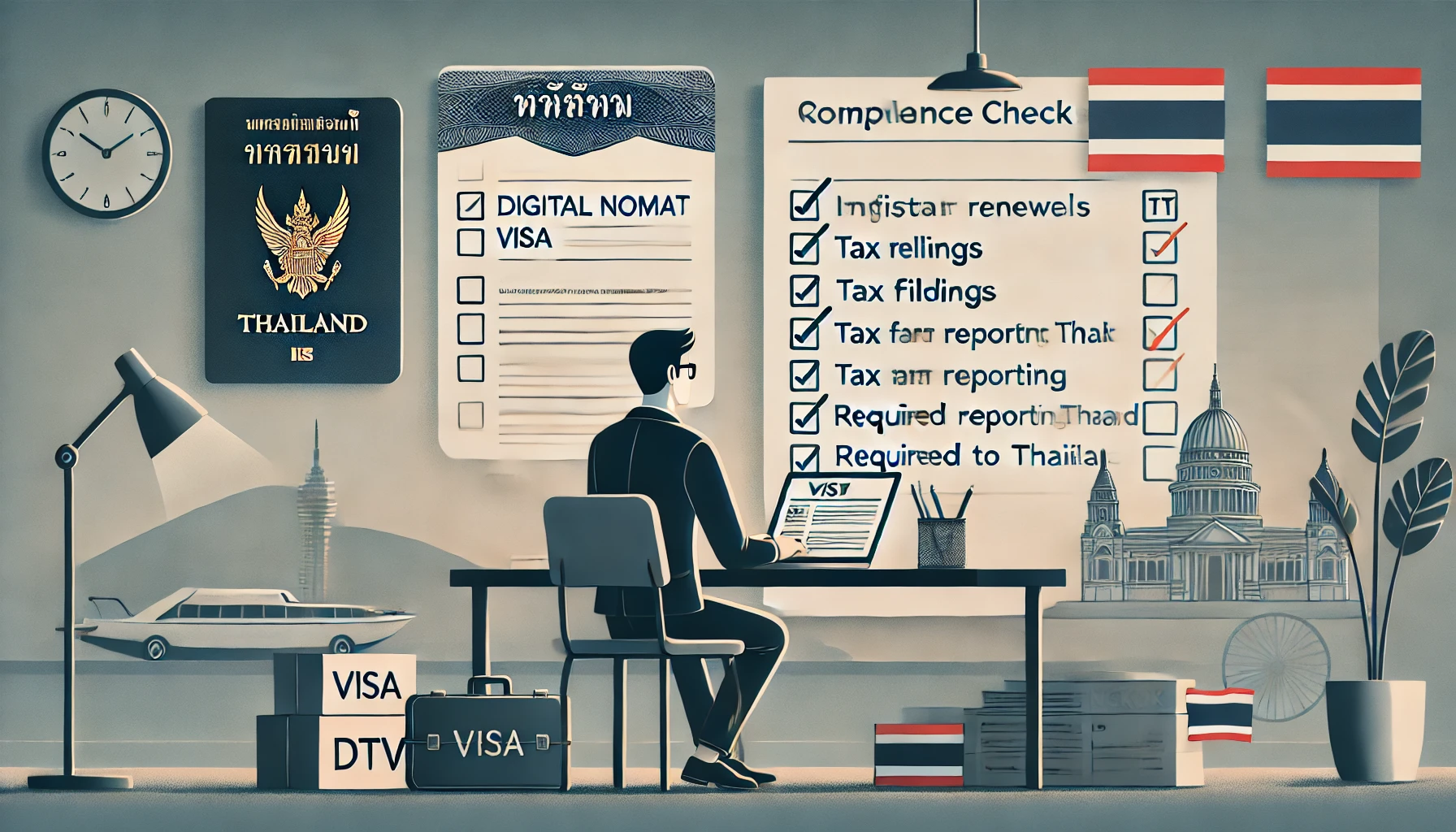
Adhering to work and income requirements
To maintain your Digital Nomad Visa (DTV) status in Thailand, it’s crucial to adhere to the work and income requirements set by the Thai government. These requirements ensure that you continue to contribute to the local economy while enjoying the benefits of living in Thailand.
- Minimum income threshold: $80,000 per year or equivalent
- Employment status: Must remain employed or self-employed
- Work restrictions: Cannot work for Thai companies without proper permits
| Requirement | Details |
|---|---|
| Income | $80,000+ annually |
| Employment | Remote work or self-employed |
| Thai work | Prohibited without additional permits |
Reporting to immigration office
Regular check-ins with the immigration office are a vital part of maintaining your DTV status. This process, known as the 90-day report, helps Thai authorities keep track of long-term visitors and ensures compliance with visa regulations.
- Report every 90 days at your local immigration office
- Provide updated address and contact information
- Confirm continued eligibility for the DTV program
Renewing the visa before expiration
To avoid any legal issues and maintain your status, it’s essential to renew your DTV before it expires. The renewal process is similar to the initial application but may require additional documentation to prove continued eligibility.
Renewal steps:
- Begin the process at least 30 days before expiration
- Gather updated financial and employment documents
- Complete the online renewal application
- Schedule an appointment at the immigration office
- Pay the renewal fee and submit required documents
By following these guidelines, you’ll ensure a smooth experience while living and working in Thailand under the Digital Nomad Visa program. Remember to stay informed about any changes in regulations and always comply with local laws to maintain your legal status in the country.
Navigating the process of obtaining a Digital Nomad Visa (DTV) in Thailand may seem daunting at first, but with careful preparation and attention to detail, it can be a smooth journey. From understanding the visa requirements to gathering necessary documents, completing the online application, attending the interview, and fulfilling post-approval steps, each stage plays a crucial role in securing your DTV.
Remember, maintaining your DTV status is just as important as obtaining it. Stay informed about any changes in regulations, fulfill your obligations, and enjoy the unique opportunity to live and work in Thailand as a digital nomad. By following this step-by-step guide, you’re well on your way to embarking on an exciting new chapter in the Land of Smiles.

